A Pedagogical Lingua Franca Approach: Emancipating the Foreign Language Learner
Main Article Content
Abstract
Research on English as a lingua franca (ELF) has inspired hopes and expectations for a reform of English language teaching (ELT). Current ideas focus on teachers’ ELF awareness and their readiness to acknowledge and deploy authentic ELF communication as a source of inspiration for pedagogical change. In this article, I take a different, yet complementary view by shifting attention to speaker-learners as emancipated agents of learning and communication. Emphasizing the ordinary social constructivist creativity of human perception, communication, and language learning, I argue for the need to encourage speaker-learners to develop their own voice in the foreign language guided by their personal requirements of communicative and communal success. The pedagogical approach by which this objective can be achieved in the ELT classroom involves enabling learners of English of different linguacultural backgrounds to meet up with each other as speakers of English in intercultural virtual exchanges and to use their common English target language as a pedagogical lingua franca (PLF). Ways of implementing a PLF approach are elaborated and exemplified with reference to telecollaboration tools and tasks available from the European Erasmus+ project TeCoLa (www.tecola.eu). Insights from case studies provide evidence of the emancipatory potential of PLF.


